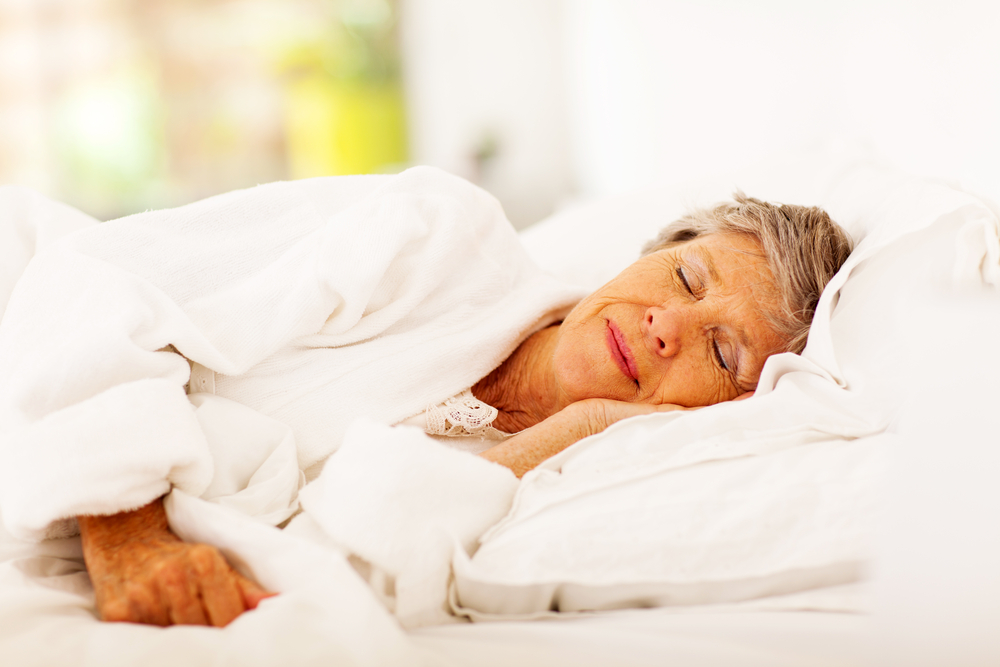As our loved ones age, they often experience normal changes in their sleeping patterns. This includes becoming sleepy at an earlier time, waking up at an earlier time or enjoying a less deep sleep. But when it comes to disturbed sleep, waking up tired every day and other symptoms of insomnia, these are not a normal part of aging. Sleep is just as important to their emotional and physical health as it was when they were younger. These tips can help your loved one overcome age-related sleep problems, get a good night’s sleep and improve the quality of his or her waking life.
Why is sleep so important for seniors?
A good night’s sleep is especially important to seniors because it helps improve concentration and memory formation. This lets the body repair any cell damage that happened during the day and refreshes the immune system. This in turn helps to prevent potential disease.
Older adults who do not sleep well are more likely to suffer from attention and memory problems, depression and experience more falls in the nighttime.
Bad sleep could also lead to serious health problems, which includes an increased risk of diabetes, cardiovascular disease, weight gain and breast cancer in women.
How sleep changes as your loved one ages
As your loved one ages, his or her body produces lower levels of growth hormone, so they will likely experience a decrease in slow wave or deep sleep. When this happens they produce less melatonin. This means that they’ll often experience more fragmented sleep and wake up more often during the night. This is why many of us consider ourselves light sleepers as we get older.
Common causes of sleep problems in seniors
Poor sleep habits and sleep environments are common causes of insomnia in seniors. These include irregular consumption of alcohol before bedtime, sleep hours and falling asleep with the television on. You should make sure your loved one’s room is dark, comfortable and quiet.
Health problems
Pain or medical conditions and health conditions such as the need to frequently urinate, asthma, osteoporosis, heartburn in the nighttime, diabetes and Alzheimer’s disease can interfere with sleep.
Menopause
Most women find that hot flashes and night sweats could interrupt sleep during menopause. Sleep problems could continue. Improving your loved one’s habits in the daytime, specifically exercise and diet, could help alleviate postmenopausal symptoms.
Medications
Seniors tend to take more medications than younger individuals. This combination of medications can impair sleep. Talk to your loved one’s doctor about making changes to their medications to improve sleep.
Lack of exercise
If your loved one is too sedentary and lacks physical activity, they may never feel sleepy or feel sleepy all the time. Regular aerobic exercise in the daytime could promote good sleep.
Stress
Huge life changes such as retirement, an untimely death of a loved one or moving out from a family home can cause stress. Nothing improves your loved one’s mood better than finding a trusting person to talk to face-to-face.
Lack of social activities
Social engagement or social activities with family members can keep your loved one’s activity level up and prepare their body for a good night’s sleep. If your loved one is now retired, he or she should try volunteering or joining a seniors’ group.
Sleep disorders
Restless Legs Syndrome (RLS) and sleep-disordered breathing, such as snoring and sleep apnea could occur more frequently in older adults.
Not enough sunlight
Bright sunlight can help regulate melatonin and your loved one’s sleep-wake cycles. He or she should try to get at least two hours of sunlight a day. He or she should also make sure to keep shades open during the day or use a light therapy box.
How to improve sleep habits
In many cases, your loved one could improve sleep by improving the sleep environment, addressing certain emotional issues and choosing healthier daily habits in the daytime. Since every individual is different, it may take some experimentation to find the specific changes that work the best to improve your loved one’s sleep.
Encourage better sleep in the nighttime
Artificial lights at night could suppress your loved one’s production of melatonin. This is the hormone that makes you fall asleep. You should make sure your loved one uses low-wattage bulbs where safe to do so and turns off the TV and computer at least one hour before bed.
They should not read from a backlit device at night, such as an iPad. If your loved one uses a portable electronic device to read, they should use an eReader that requires an additional light source.
Your loved one should make sure their bedroom is dark and quiet. Seniors oftentimes become more sensitive to noise as they age. Light and heat could also cause sleep problems. Using ear plugs, a sound machine or a sleep mask can help.
Do you have a question about sleep tips for seniors? Click here to contact Colonial Home Care Services today!




